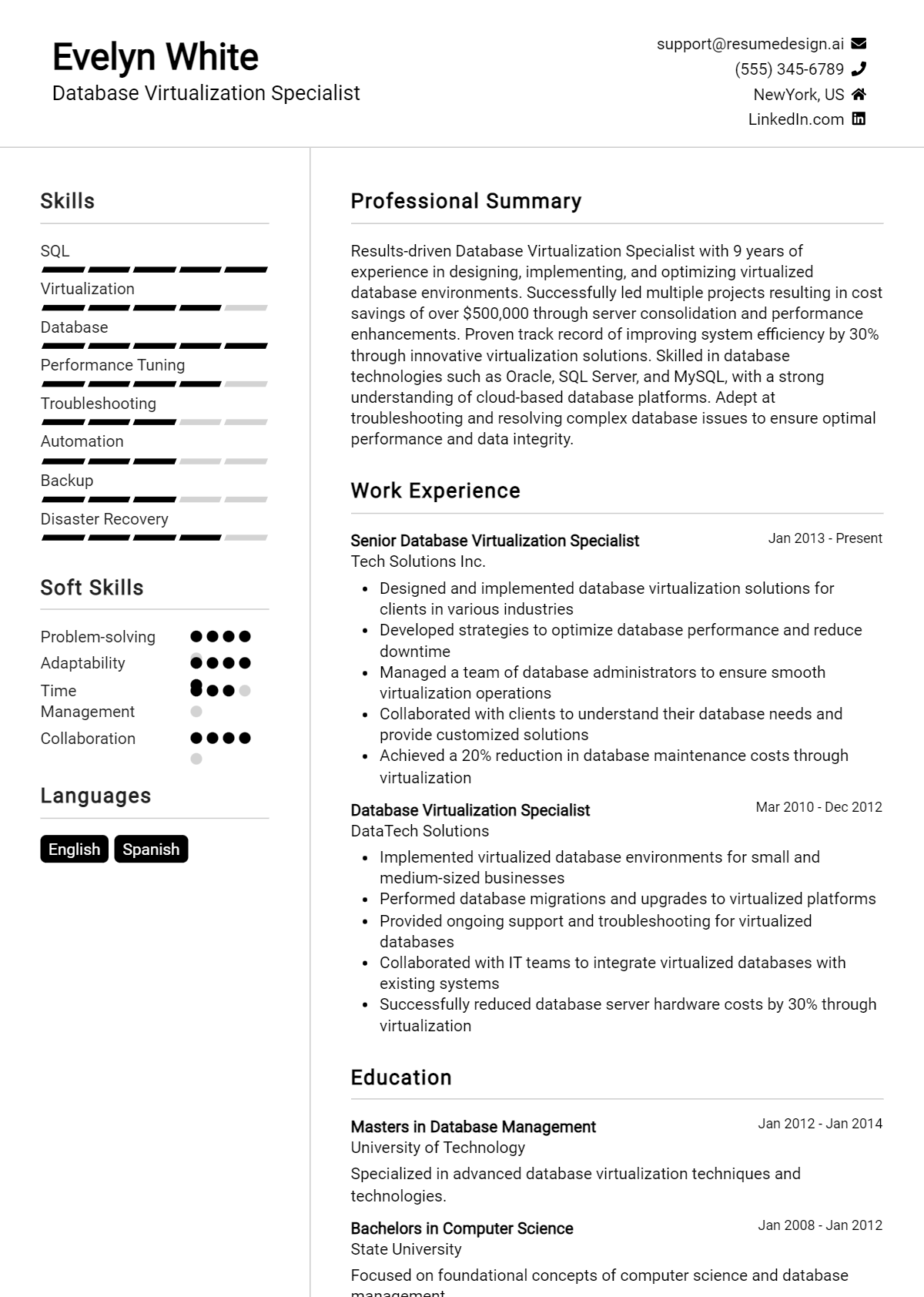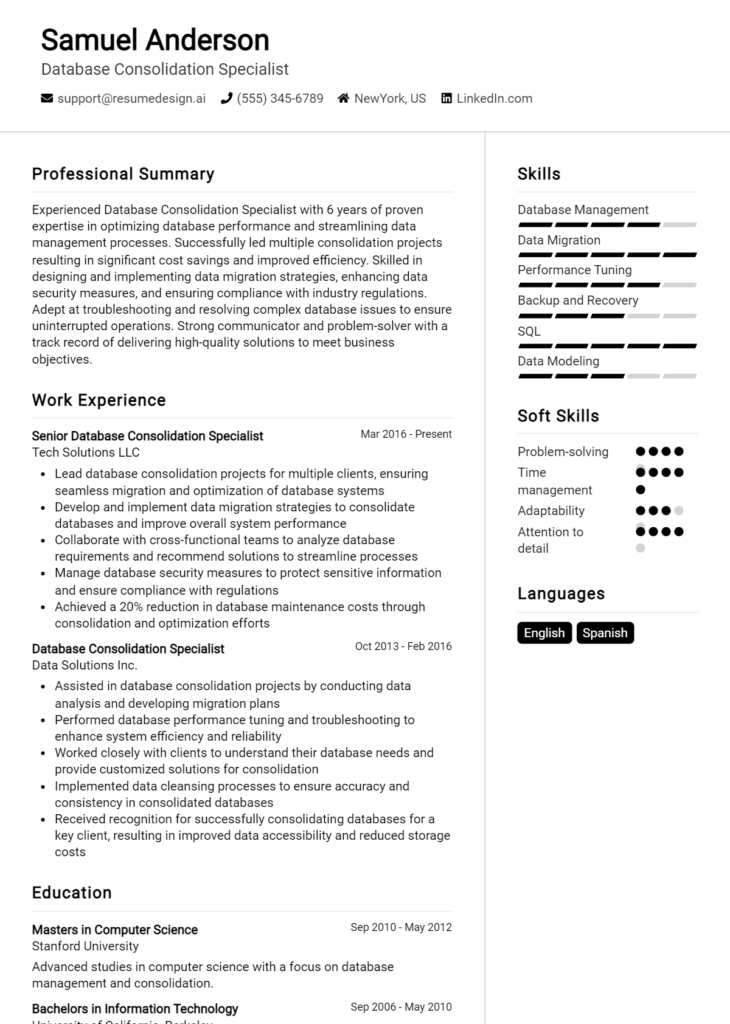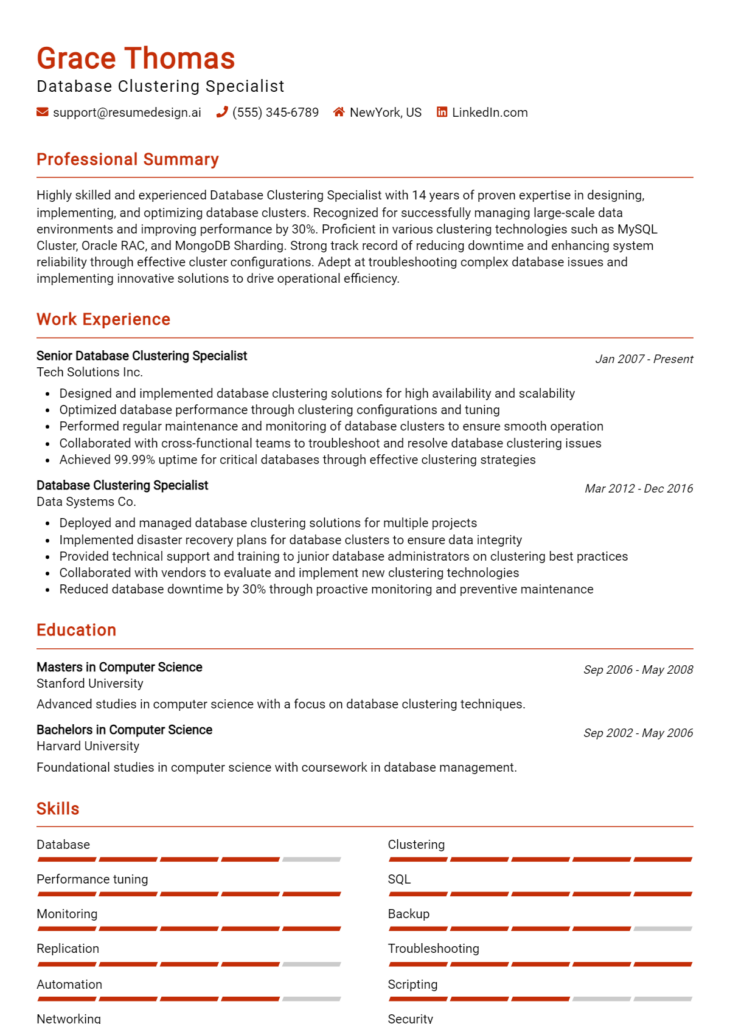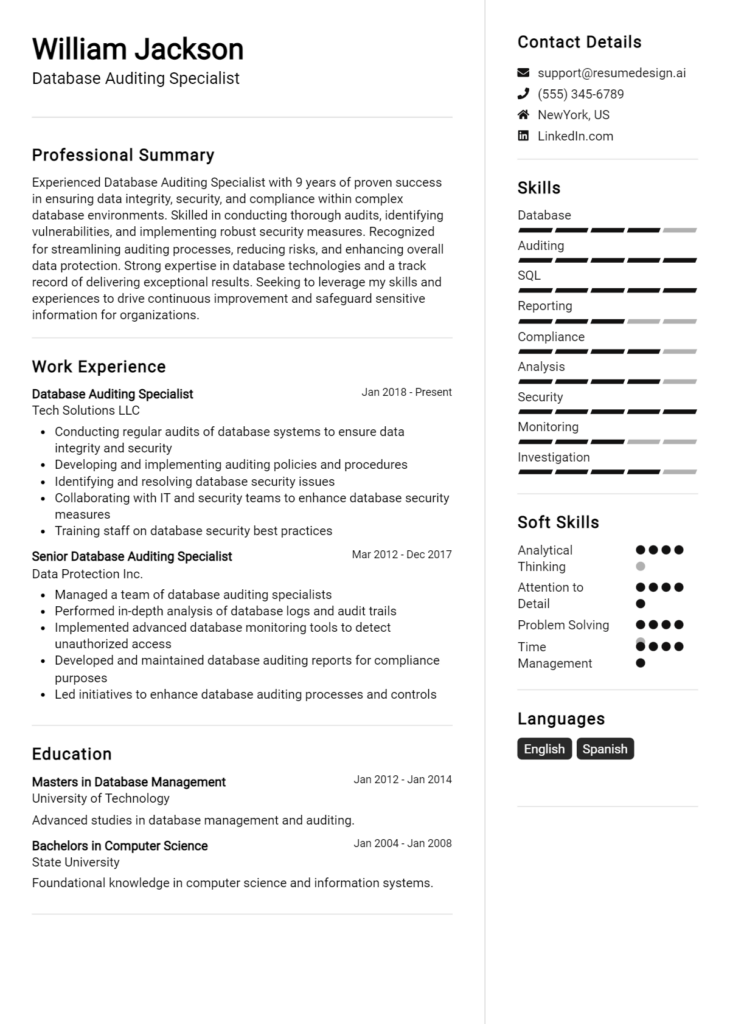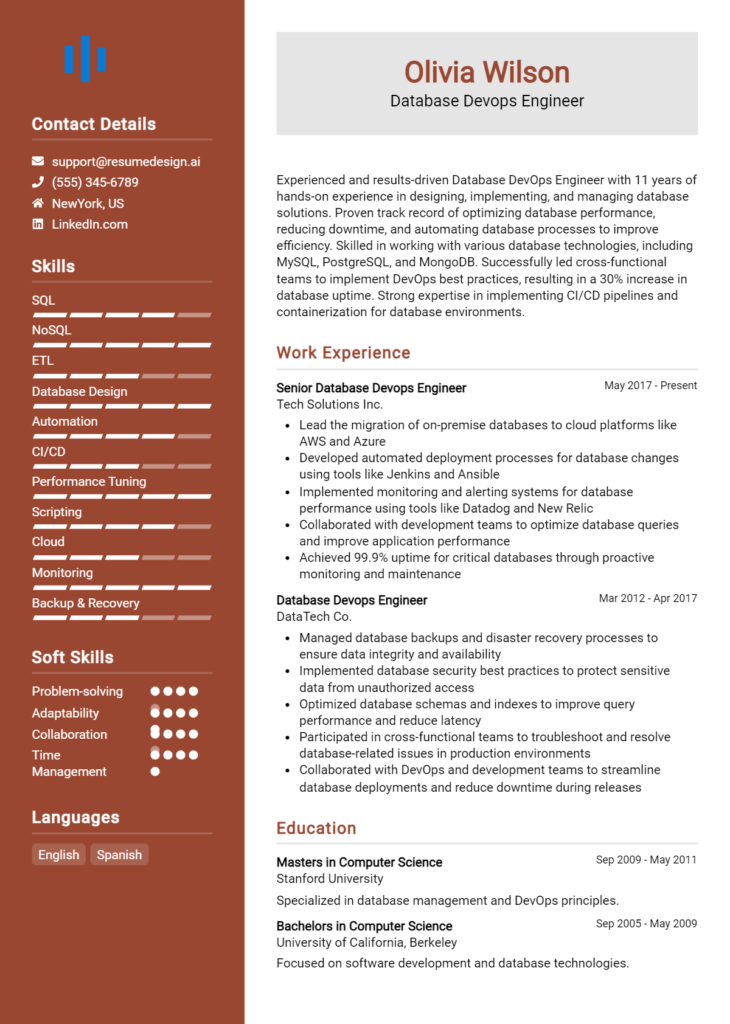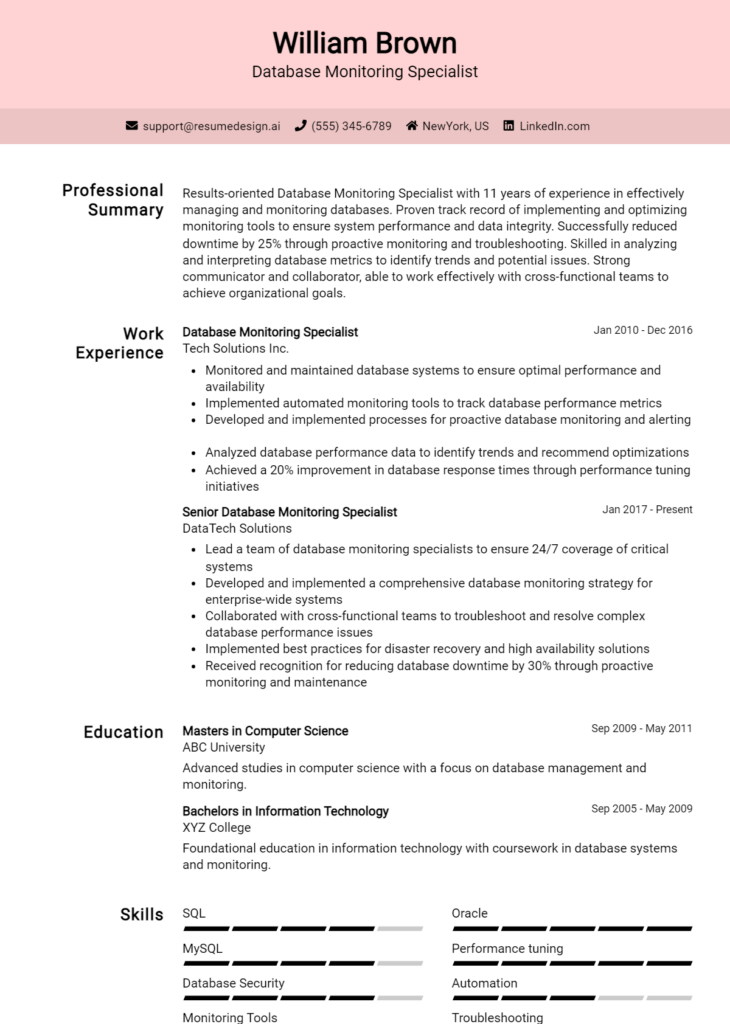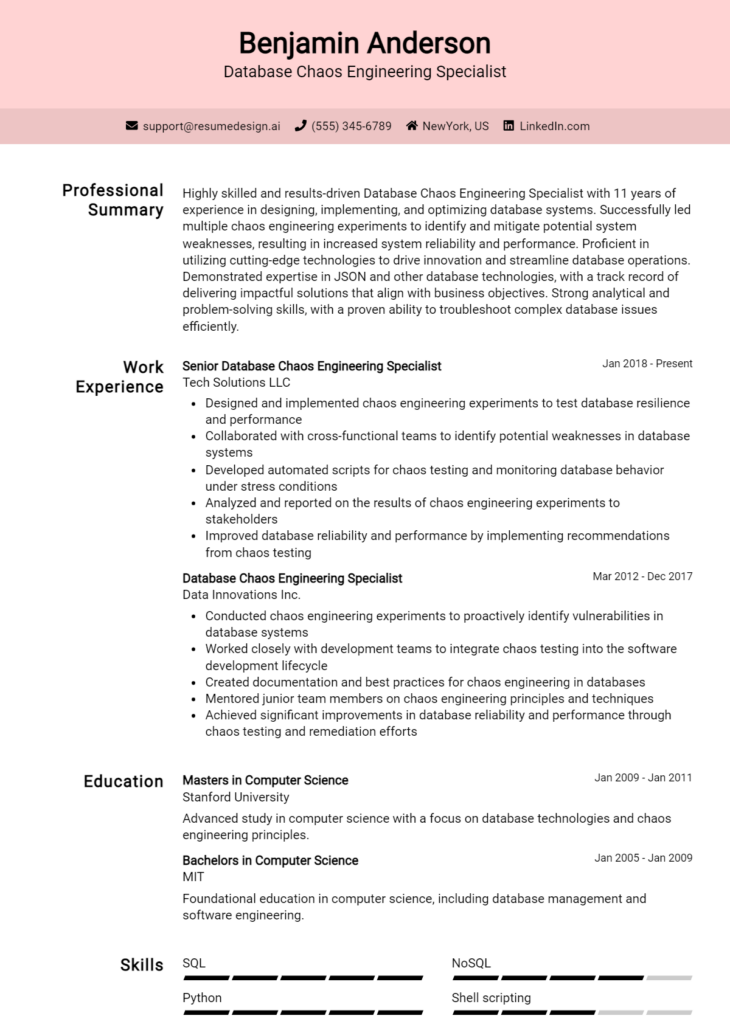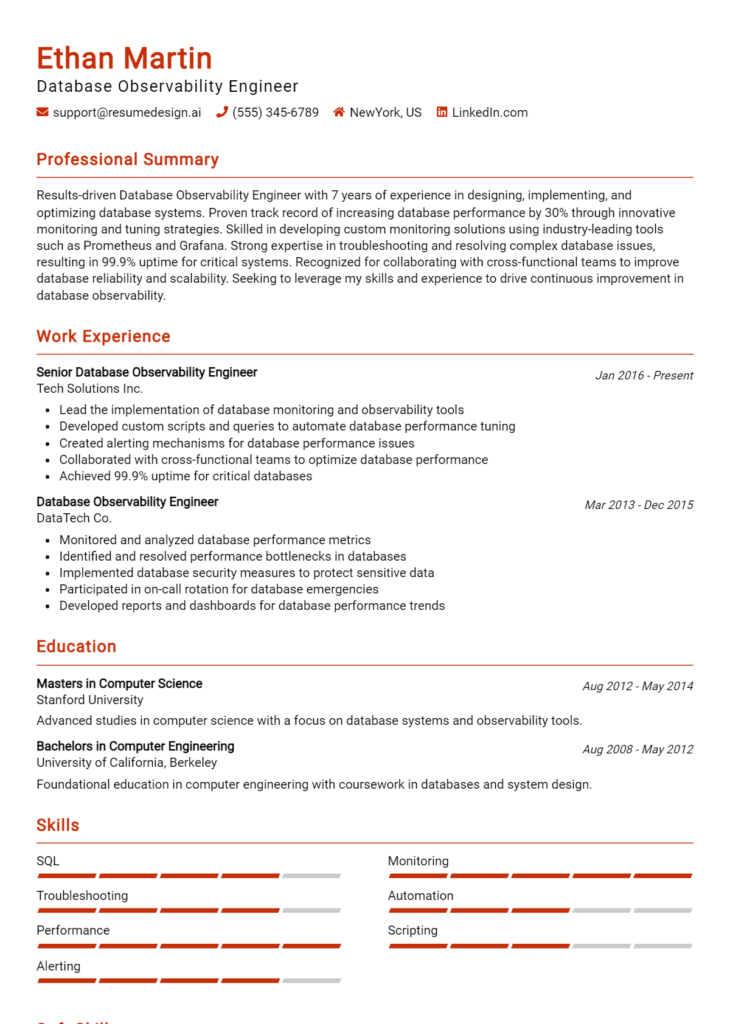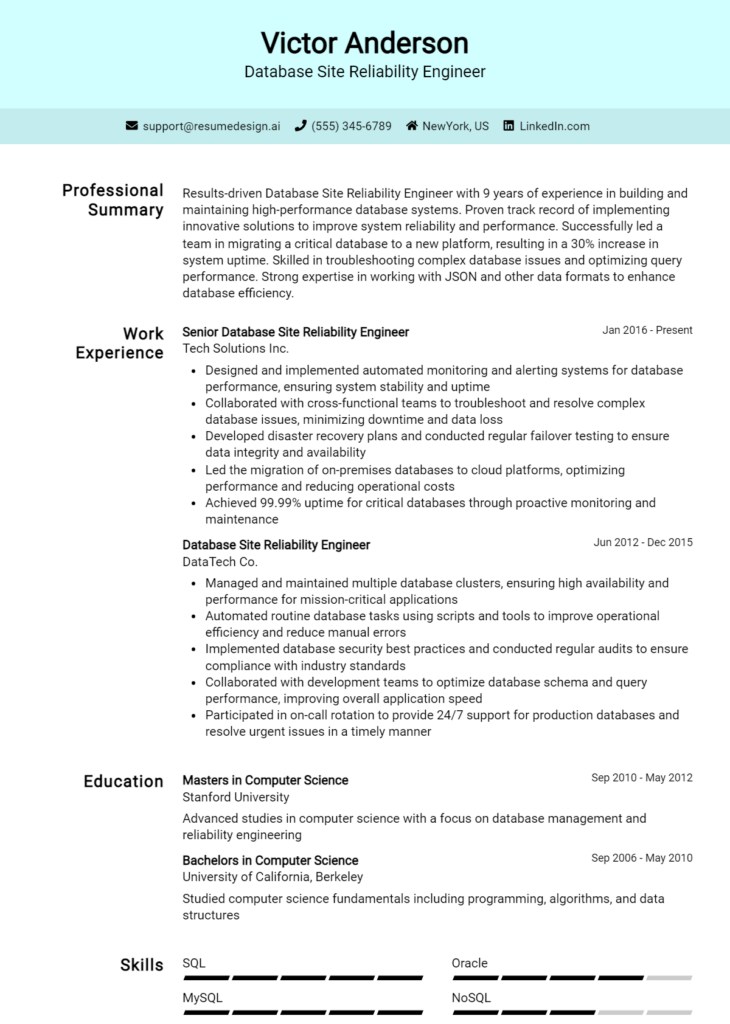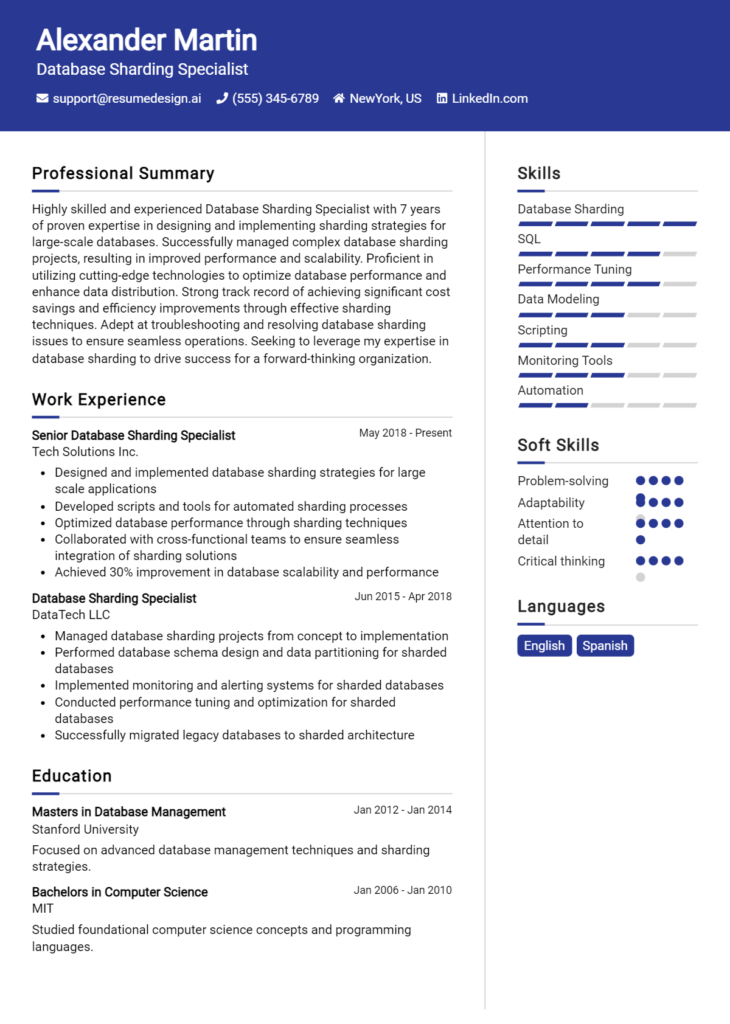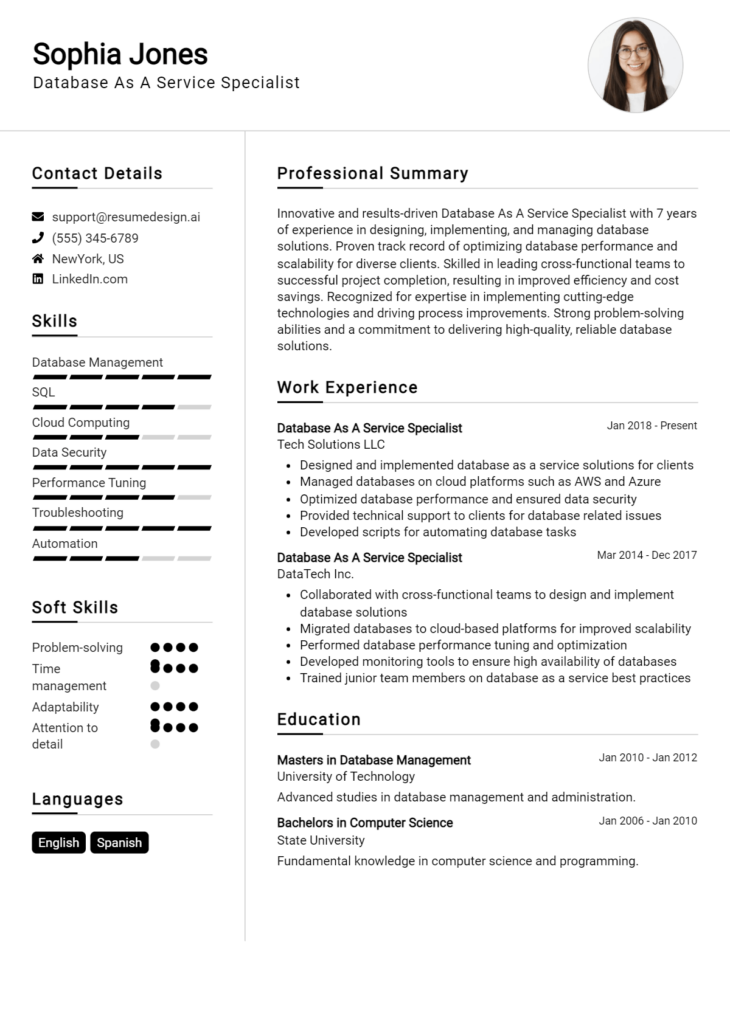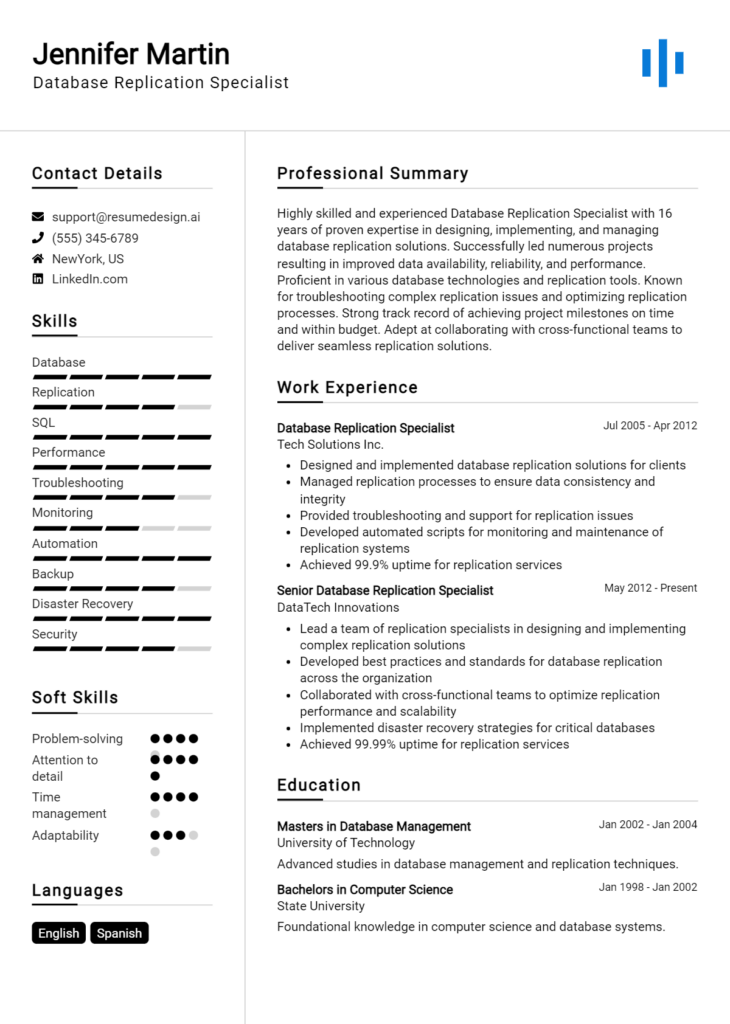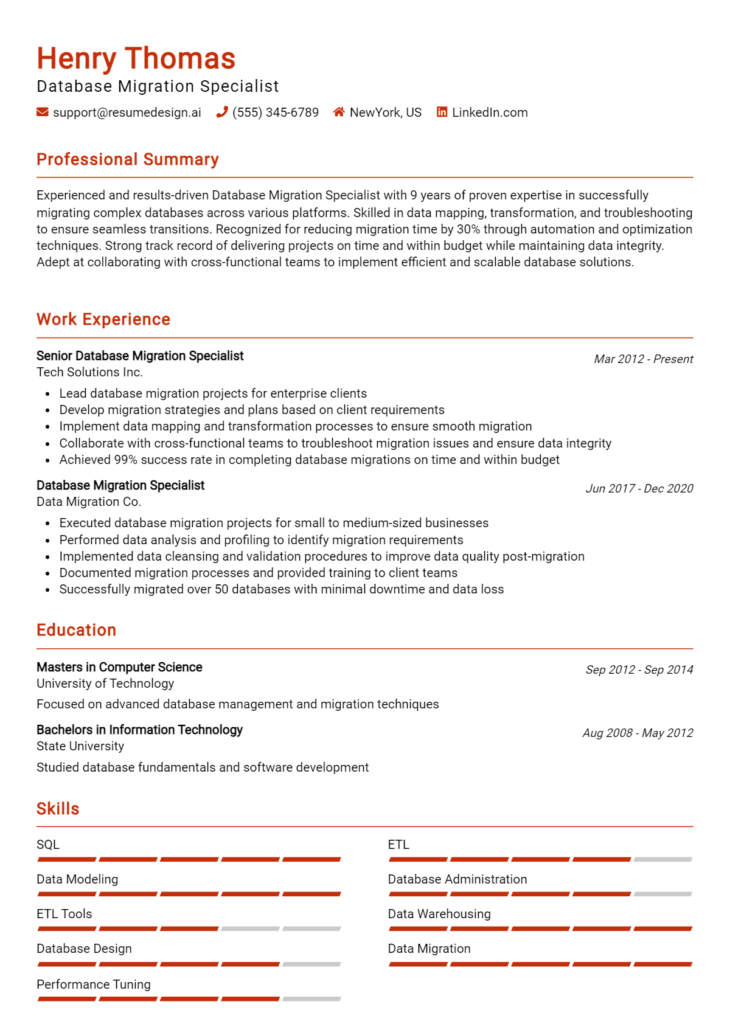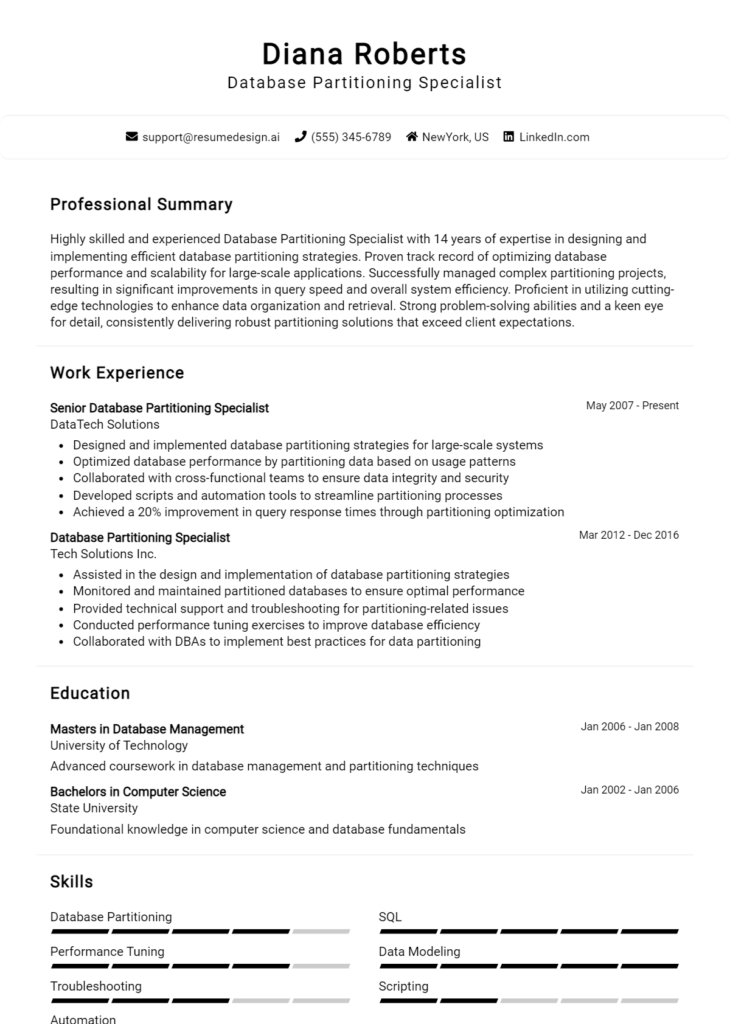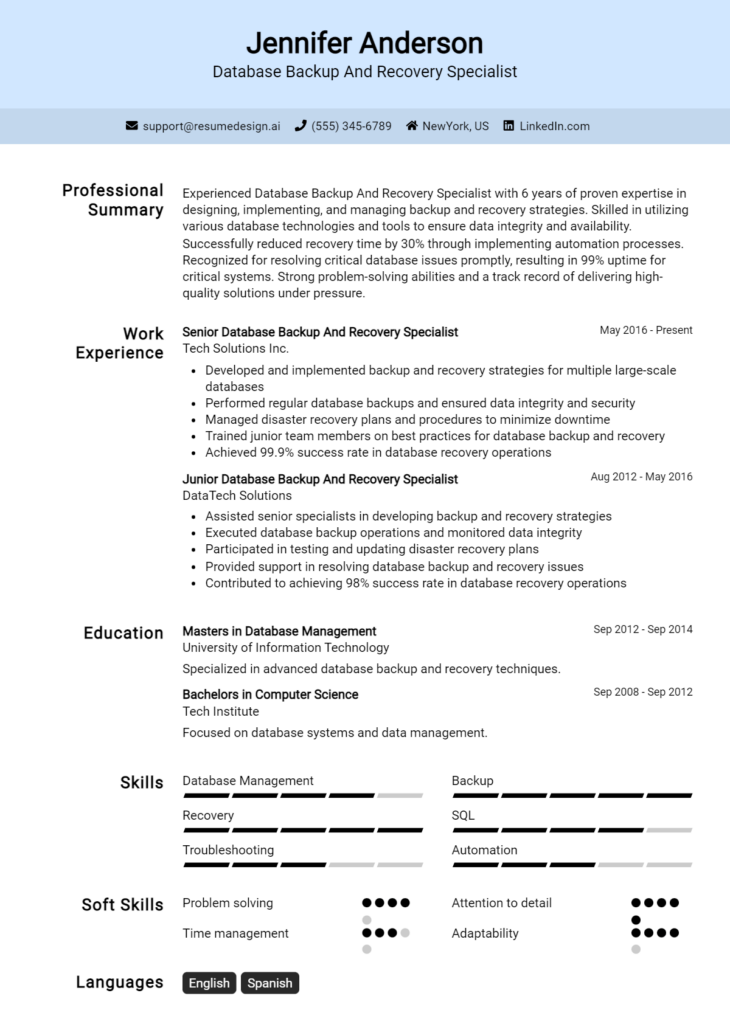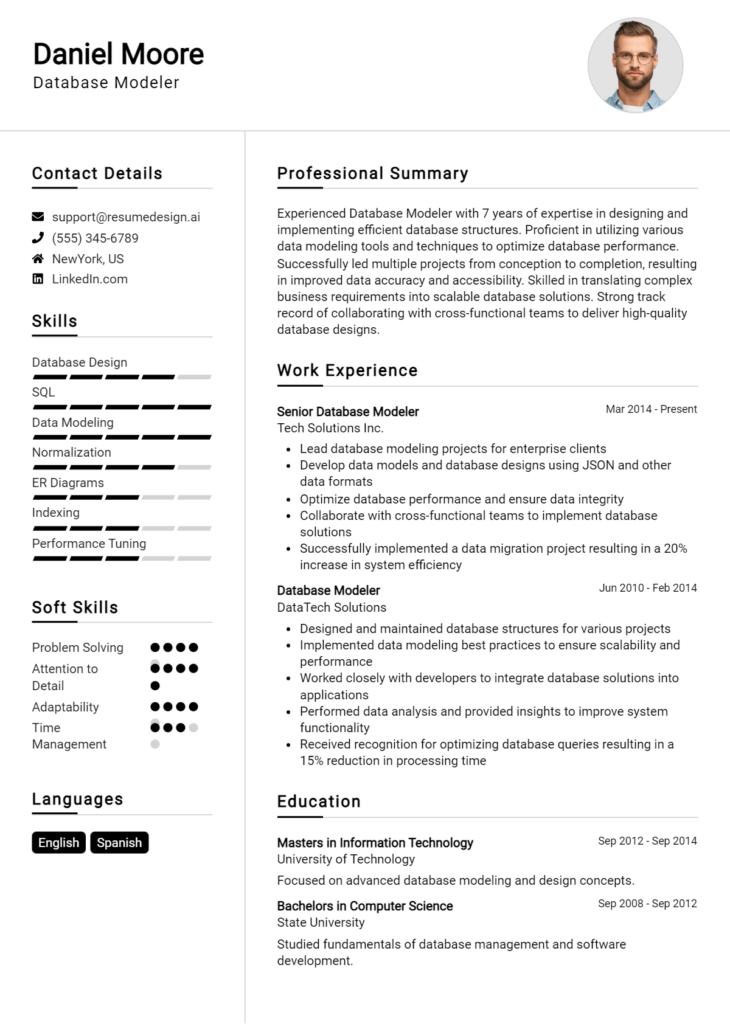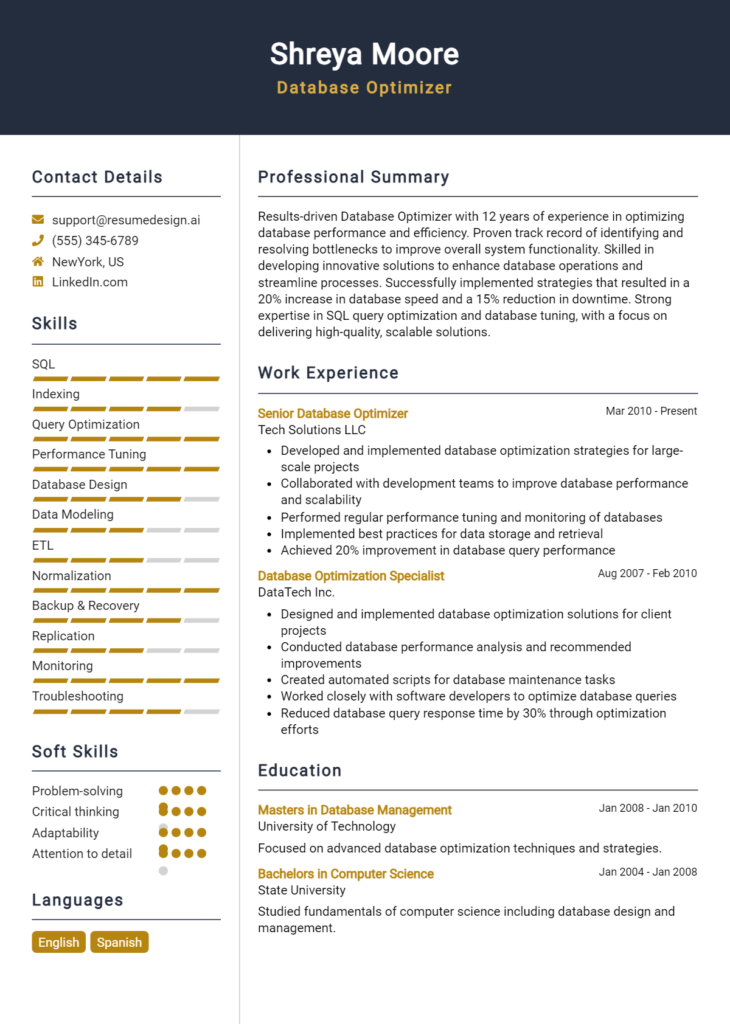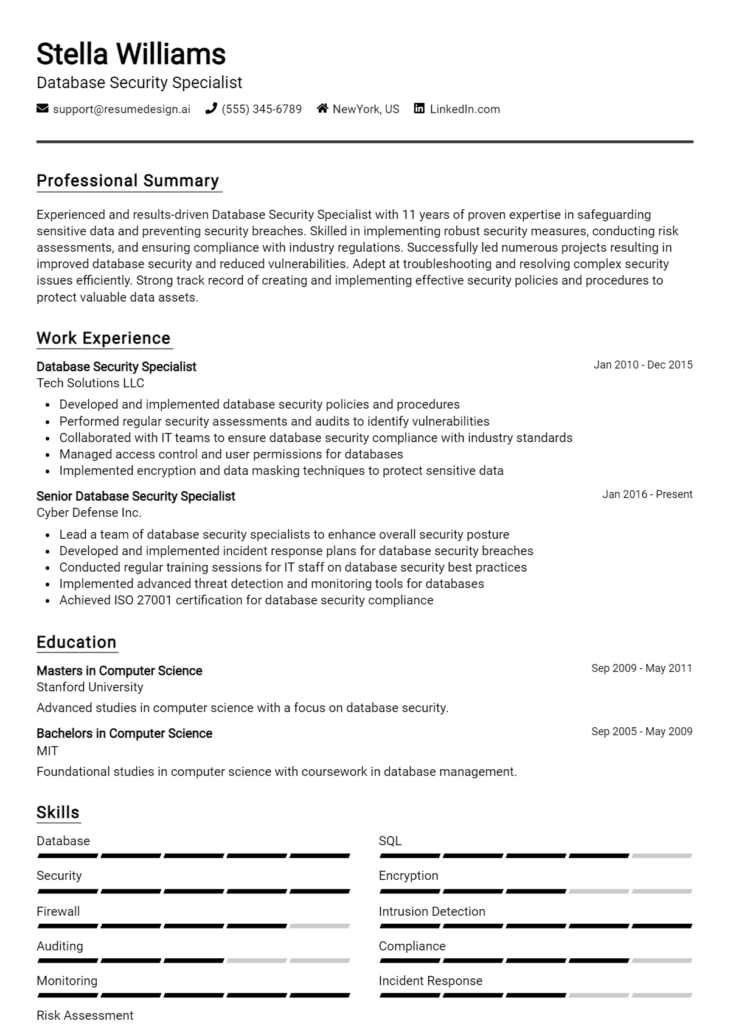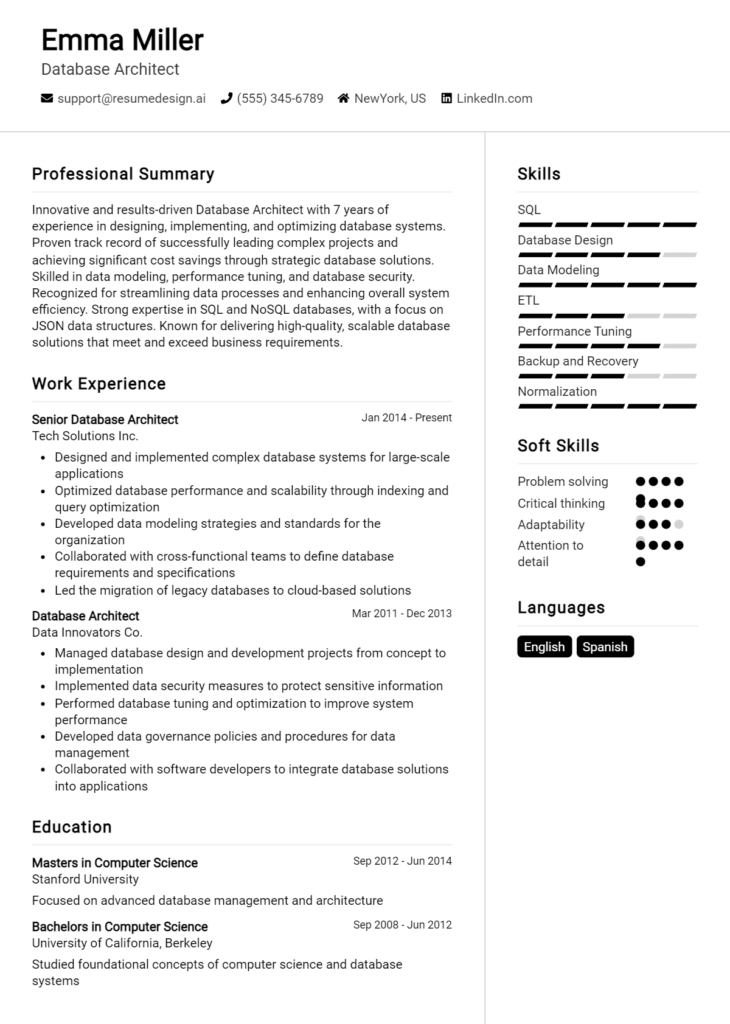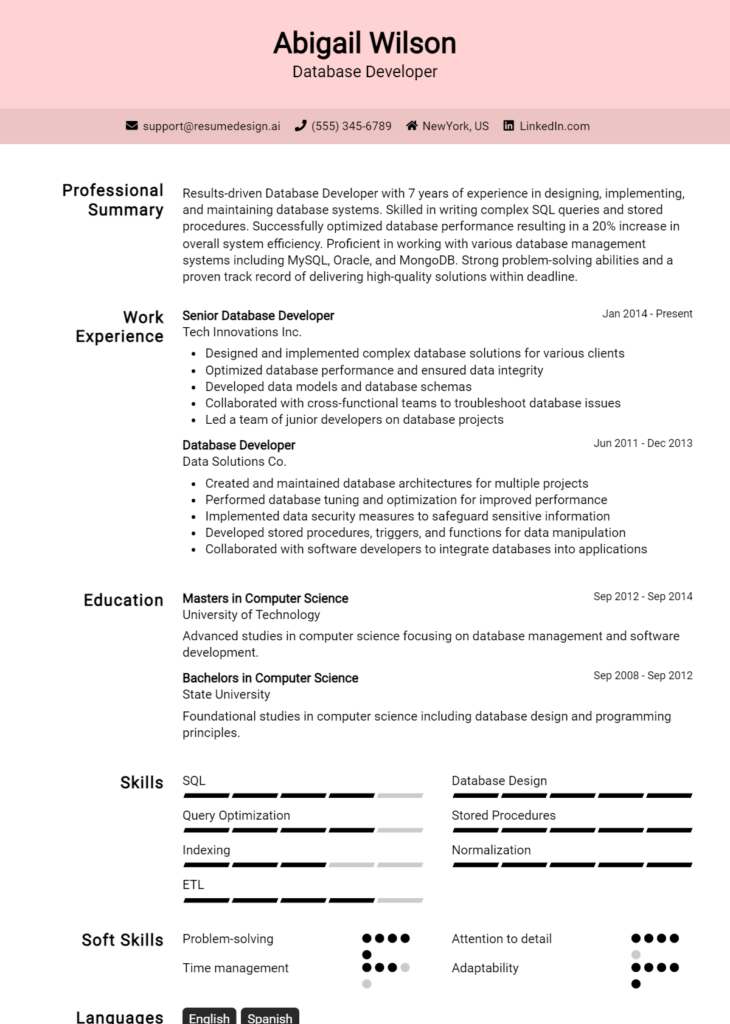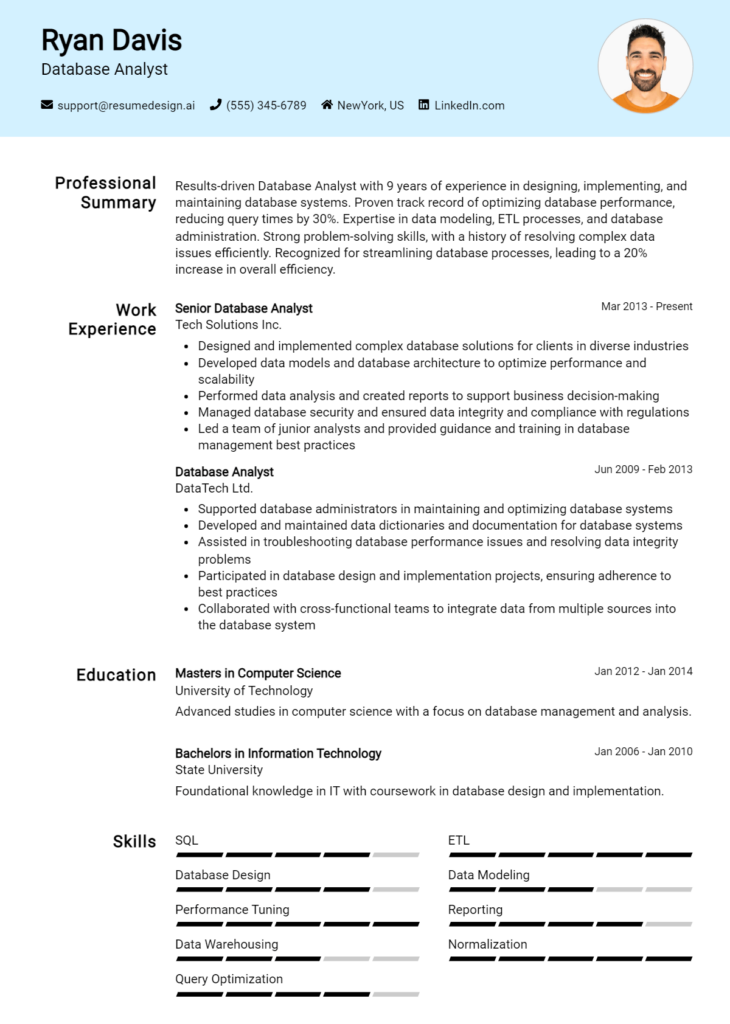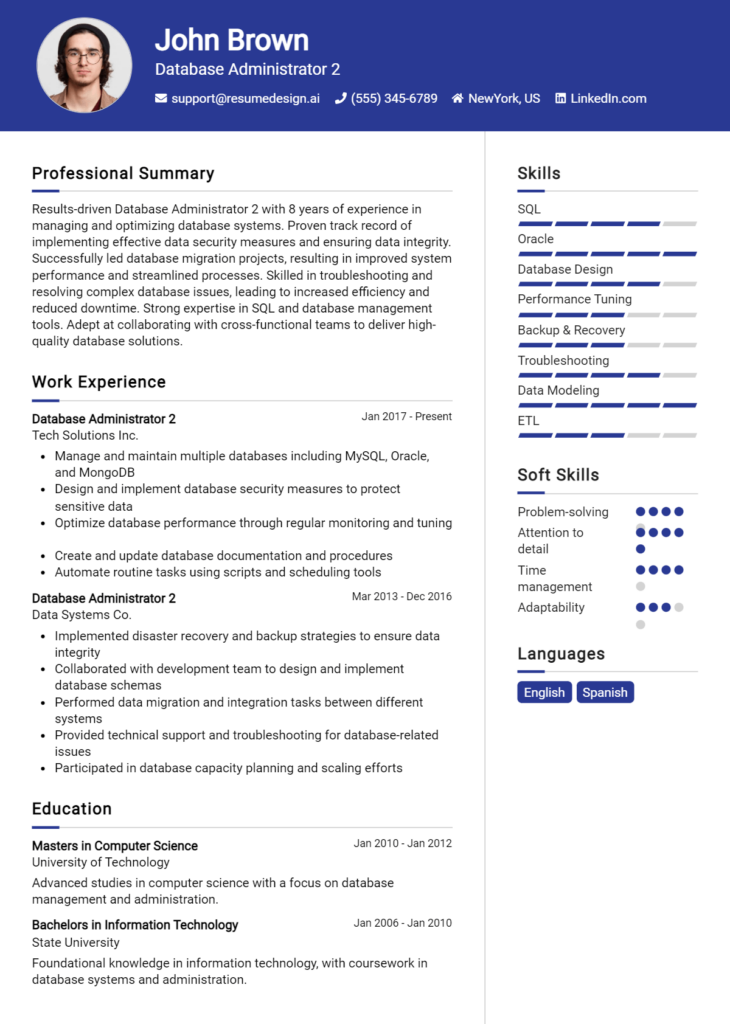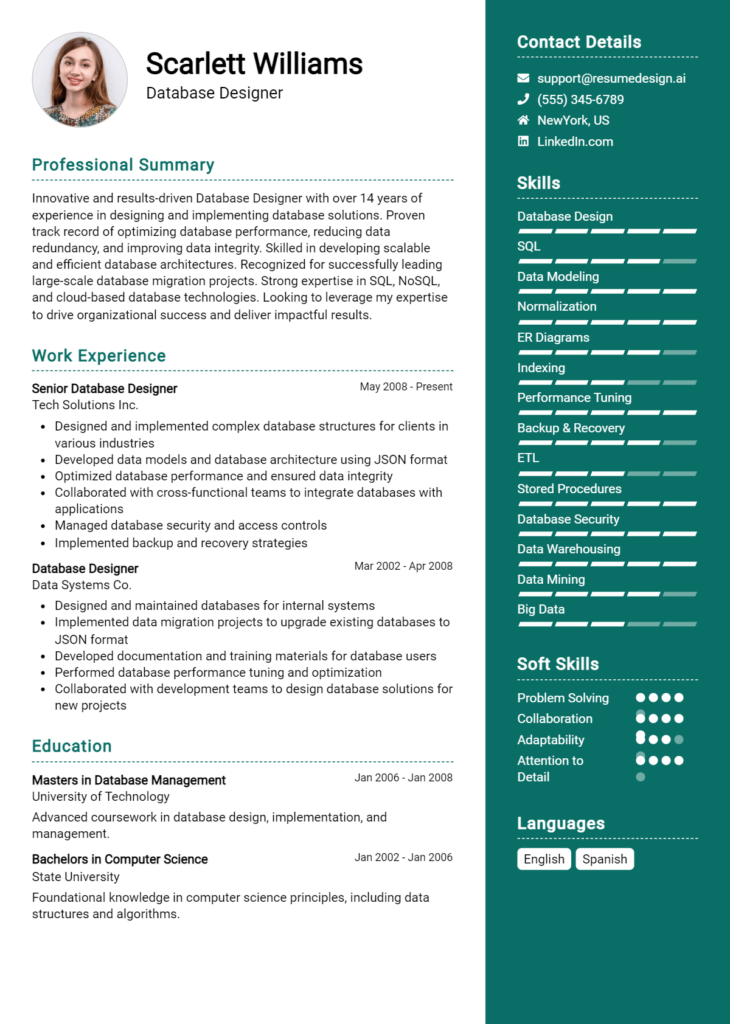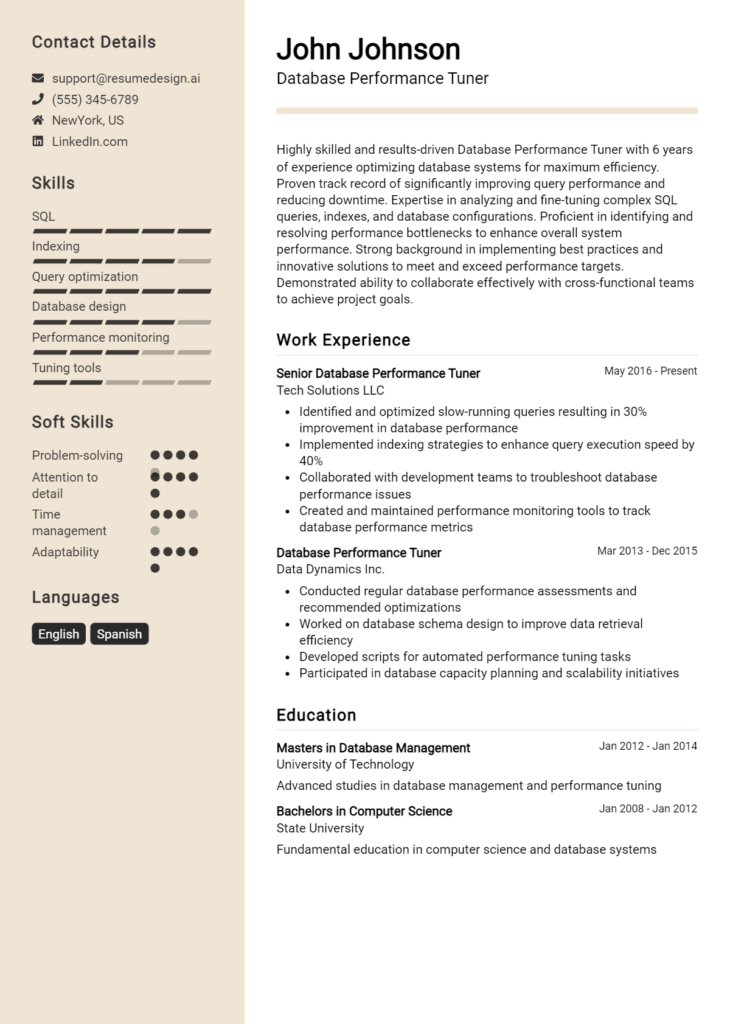Database Virtualization Specialist Core Responsibilities
A Database Virtualization Specialist plays a crucial role in optimizing database environments, ensuring seamless integration across departments. Their key responsibilities include deploying, managing, and securing virtualized databases while collaborating with IT, development, and operations teams. Strong technical skills in virtualization technologies, operational efficiency, and advanced problem-solving abilities are essential for success. These competencies not only enhance data accessibility and performance but also align with organizational goals. A well-structured resume can effectively showcase these qualifications, highlighting the professional's value to potential employers.
Common Responsibilities Listed on Database Virtualization Specialist Resume
- Design and implement database virtualization solutions.
- Monitor and optimize virtualized database performance.
- Ensure data security and compliance across virtual environments.
- Collaborate with cross-functional teams to define requirements.
- Troubleshoot and resolve database-related issues.
- Conduct regular backups and disaster recovery planning.
- Develop documentation for database virtualization processes.
- Stay updated on virtualization technologies and trends.
- Assist in capacity planning and resource allocation.
- Provide training and support for end-users and staff.
High-Level Resume Tips for Database Virtualization Specialist Professionals
In the competitive landscape of database virtualization, a well-crafted resume is essential for professionals aspiring to stand out in front of potential employers. Your resume serves as your first impression and a critical marketing tool that showcases your skills, achievements, and expertise in the field. A compelling resume not only highlights your technical proficiency but also illustrates your ability to deliver value in a rapidly evolving technological environment. This guide will provide practical and actionable resume tips specifically tailored for Database Virtualization Specialist professionals, ensuring your credentials resonate with hiring managers and set you apart from the competition.
Top Resume Tips for Database Virtualization Specialist Professionals
- Tailor your resume to match the job description, ensuring the use of relevant keywords and phrases that align with the position.
- Highlight your experience with specific database virtualization technologies, such as VMware, Microsoft Hyper-V, or Oracle VM.
- Quantify your achievements with metrics, such as cost savings achieved through virtualization, performance improvements, or efficiency gains.
- Showcase your understanding of cloud-based solutions and how they integrate with database virtualization.
- Include any relevant certifications, such as those from VMware, Microsoft, or AWS, to demonstrate your commitment to professional development.
- Emphasize your problem-solving skills by detailing specific challenges you’ve overcome in previous roles related to database virtualization.
- List any experience with scripting or automation tools that enhance database management and virtualization processes.
- Utilize a clean and professional layout, making it easy for hiring managers to navigate through your qualifications quickly.
- Incorporate a summary statement at the top of your resume that encapsulates your experience and enthusiasm for database virtualization.
- Keep your resume concise, ideally one to two pages, focusing on the most relevant experience and skills.
Implementing these tips can significantly enhance your chances of landing a job in the Database Virtualization Specialist field. By presenting a polished, targeted resume that effectively showcases your relevant skills and accomplishments, you position yourself as a strong candidate capable of contributing to the success of potential employers in this dynamic industry.
Why Resume Headlines & Titles are Important for Database Virtualization Specialist
In the competitive field of database virtualization, a well-crafted resume headline or title can serve as the first impression a hiring manager has of a candidate. This crucial element not only grabs attention but also succinctly summarizes the candidate's key qualifications and expertise in a single impactful phrase. A strong headline should be concise, relevant, and directly connected to the specific job being applied for, setting the stage for the rest of the resume and effectively showcasing the candidate's suitability for the role.
Best Practices for Crafting Resume Headlines for Database Virtualization Specialist
- Keep it concise—aim for one impactful phrase that encapsulates your expertise.
- Use role-specific terminology to demonstrate familiarity with the industry.
- Highlight your most relevant skills or achievements related to database virtualization.
- Avoid jargon or overly technical language that may confuse readers.
- Incorporate keywords from the job description to align with what employers are seeking.
- Focus on the value you bring to potential employers, emphasizing results-oriented language.
- Make it unique to differentiate yourself from other candidates.
- Test different versions to see which resonates best with hiring professionals.
Example Resume Headlines for Database Virtualization Specialist
Strong Resume Headlines
"Certified Database Virtualization Expert with 7+ Years of Experience in Cloud Solutions"
"Results-Driven Database Specialist Skilled in Virtualization and Performance Optimization"
“Innovative Database Virtualization Specialist Focused on Cost Reduction and Efficiency Improvement”
Weak Resume Headlines
“Database Professional”
“Experienced in IT”
The strong headlines are effective because they provide clear, specific information about the candidate's expertise and experience, allowing hiring managers to quickly assess their fit for the role. In contrast, the weak headlines fail to impress due to their vagueness and lack of detail; they do not convey any unique qualifications or relevant skills that would make the candidate stand out in a crowded job market.
Writing an Exceptional Database Virtualization Specialist Resume Summary
A resume summary is a crucial element for a Database Virtualization Specialist, as it serves as the first impression for hiring managers. A well-crafted summary can quickly capture attention by highlighting key skills, relevant experience, and notable accomplishments that align with the job requirements. It should be concise yet impactful, effectively summarizing the candidate's qualifications in a way that resonates with the specific role being applied for. This strategic approach not only showcases the candidate’s expertise but also sets the tone for the rest of the resume, making it an essential component in the job application process.
Best Practices for Writing a Database Virtualization Specialist Resume Summary
- Quantify Achievements: Use specific numbers or percentages to highlight your contributions and successes.
- Focus on Relevant Skills: Emphasize technical skills and tools that are directly applicable to database virtualization.
- Tailor the Summary: Customize your summary to reflect the exact requirements and keywords from the job description.
- Be Concise: Keep it brief—ideally 2-4 sentences that make a strong impact.
- Highlight Certifications: Mention any relevant certifications or training that enhance your qualifications.
- Showcase Soft Skills: Include essential soft skills like problem-solving and teamwork that complement your technical abilities.
- Use Active Language: Employ strong action verbs to convey confidence and proactivity.
- Include Industry Terminology: Utilize industry-specific terminology to demonstrate your familiarity with the field.
Example Database Virtualization Specialist Resume Summaries
Strong Resume Summaries
Results-driven Database Virtualization Specialist with over 7 years of experience in optimizing data management systems, achieving a 30% reduction in server costs through effective virtualization strategies. Proficient in VMware, SQL, and cloud-based solutions, consistently delivering high-performance environments that support business growth.
Dedicated Database Virtualization Expert with a track record of improving database efficiency by 40% through innovative virtualization techniques. Skilled in deploying and managing multi-tenant databases, with extensive experience in Azure and AWS platforms, ensuring seamless integration and data accessibility.
Accomplished Database Virtualization Specialist with a Master's degree in Computer Science and 5+ years of hands-on experience. Successfully led a team in a project that migrated over 500 databases to a cloud infrastructure, resulting in a 25% increase in operational efficiency.
Weak Resume Summaries
Experienced database professional with knowledge of virtualization technologies. Looking for new opportunities to apply skills.
Database Virtualization Specialist with some experience in the field. Interested in helping companies improve their database systems.
The strong resume summaries are considered effective because they provide specific, quantifiable achievements and showcase relevant skills tailored to the role of a Database Virtualization Specialist. They demonstrate how the candidate has made a measurable impact in previous positions, thereby enhancing their appeal to potential employers. In contrast, the weak summaries are vague and lack detail, failing to convey any significant accomplishments or relevant expertise that would differentiate the candidate from others, making them less likely to capture a hiring manager's interest.
Work Experience Section for Database Virtualization Specialist Resume
The work experience section of a Database Virtualization Specialist resume is crucial for demonstrating a candidate's technical expertise and professional growth in the field. This section not only highlights the candidate's ability to manage complex database environments but also showcases their leadership skills in guiding teams toward delivering high-quality, efficient products. By quantifying achievements and aligning experiences with industry standards, candidates can effectively illustrate their value to potential employers, making a compelling case for their suitability for the role.
Best Practices for Database Virtualization Specialist Work Experience
- Clearly outline technical skills relevant to database virtualization, such as cloud platforms, virtualization technologies, and data management tools.
- Quantify achievements with specific metrics, such as performance improvements, cost savings, or increased efficiency.
- Highlight experience in leading cross-functional teams and collaborating with stakeholders to ensure project success.
- Use action verbs to convey impact and contributions effectively.
- Align work experience descriptions with industry standards and terminology to resonate with hiring managers.
- Include relevant certifications or training that enhance technical qualifications.
- Showcase adaptability by mentioning involvement in migrating legacy systems to virtual environments.
- Emphasize problem-solving skills by providing examples of challenges faced and solutions implemented.
Example Work Experiences for Database Virtualization Specialist
Strong Experiences
- Led a team of 10 in a successful migration of over 500 databases to a cloud-based virtualization platform, resulting in a 30% reduction in operational costs.
- Developed and implemented a database performance tuning strategy that increased query response times by 40%, significantly enhancing user experience.
- Collaborated with IT and business units to design a virtual disaster recovery plan, achieving a recovery time objective (RTO) of less than 2 hours.
- Managed the deployment of containerized database solutions, improving scalability and reducing resource consumption by 20%.
Weak Experiences
- Worked on database projects with some team members, contributing to various tasks.
- Assisted in implementing virtualization technologies without specific details on impact or outcomes.
- Gained experience in database management, but did not specify any quantifiable achievements.
- Participated in meetings to discuss database issues without outlining specific contributions or resolutions.
The experiences listed as strong are considered exemplary because they provide concrete, measurable outcomes and demonstrate leadership and collaboration in meaningful projects. They highlight specific achievements that resonate with prospective employers. In contrast, the weak experiences lack detail and quantifiable results, making them less impactful and difficult to assess in terms of the candidate's capabilities and contributions to past roles.
Education and Certifications Section for Database Virtualization Specialist Resume
The education and certifications section of a Database Virtualization Specialist resume is crucial for showcasing a candidate's academic qualifications and professional credentials. This section highlights the candidate's foundational knowledge in database management, virtualization technologies, and their commitment to ongoing professional development through industry-recognized certifications. By providing relevant coursework, specialized training, and certifications, candidates can significantly enhance their credibility and demonstrate alignment with the specific requirements of the job role, making them more appealing to potential employers.
Best Practices for Database Virtualization Specialist Education and Certifications
- Include degrees in Computer Science, Information Technology, or related fields that directly relate to database management.
- Highlight industry-recognized certifications such as Microsoft Certified: Azure Database Administrator Associate or VMware Certified Professional.
- Provide details about relevant coursework, particularly those focused on database design, virtualization technologies, or cloud computing.
- Showcase any specialized training in specific database platforms or virtualization tools, such as Oracle or VMware.
- List certifications that demonstrate continuous learning, such as recent courses or updates on emerging technologies.
- Organize the section clearly, separating degrees, certifications, and training for easy readability.
- Include the date of completion for certifications to emphasize up-to-date knowledge.
- Avoid including irrelevant degrees or certifications that do not pertain to the database virtualization field.
Example Education and Certifications for Database Virtualization Specialist
Strong Examples
- Bachelor of Science in Computer Science, University of Technology, 2020
- VMware Certified Professional - Data Center Virtualization (VCP-DCV), 2023
- Microsoft Certified: Azure Database Administrator Associate, 2022
- Advanced Database Management Course, Online Learning Platform, 2021
Weak Examples
- Associate Degree in Art History, Community College, 2015
- Certification in Basic Computer Skills, 2010
- Diploma in Graphic Design, Technical Institute, 2018
- Old Oracle Certified Professional (OCP) certification obtained in 2010
The strong examples are considered relevant as they directly align with the requirements and technologies pertinent to the Database Virtualization Specialist role. They demonstrate an academic background in computer science along with up-to-date certifications that showcase practical knowledge and skills in virtualization. In contrast, the weak examples lack relevance to the field of database virtualization and may mislead potential employers regarding the candidate's qualifications. Degrees and certifications that do not pertain to the position can detract from the overall effectiveness of the resume.
Top Skills & Keywords for Database Virtualization Specialist Resume
In the rapidly evolving field of database virtualization, possessing the right skills is paramount for a Database Virtualization Specialist. A well-crafted resume that highlights both hard and soft skills not only showcases a candidate's technical expertise but also demonstrates their ability to work effectively in a team and manage projects efficiently. Skills in database management, virtualization technologies, and problem-solving are essential, but interpersonal skills such as communication and collaboration can significantly enhance a candidate's profile. By focusing on these competencies, job seekers can create compelling resumes that stand out in a competitive job market.
Top Hard & Soft Skills for Database Virtualization Specialist
Soft Skills
- Strong communication skills
- Team collaboration
- Problem-solving ability
- Adaptability to changing technologies
- Critical thinking
- Time management
- Attention to detail
- Initiative and self-motivation
- Interpersonal skills
- Customer service orientation
Hard Skills
- Proficiency in virtualization technologies (e.g., VMware, Hyper-V)
- Experience with database management systems (e.g., Oracle, SQL Server, MySQL)
- Knowledge of cloud computing platforms (e.g., AWS, Azure)
- Familiarity with containerization technologies (e.g., Docker, Kubernetes)
- Understanding of data security and compliance standards
- Scripting and automation skills (e.g., PowerShell, Python)
- Database performance tuning and optimization
- Backup and recovery solutions
- Networking fundamentals
- Experience with monitoring and troubleshooting tools
For more insights on relevant skills and how to effectively present your work experience, ensure your resume aligns with industry standards and showcases your qualifications.
Stand Out with a Winning Database Virtualization Specialist Cover Letter
Dear Hiring Manager,
I am excited to apply for the Database Virtualization Specialist position at [Company Name], as advertised on [Job Board/Company Website]. With a strong background in database management and virtualization technologies, I am confident in my ability to contribute effectively to your team. My experience in optimizing database performance and implementing virtualization solutions aligns perfectly with the requirements of this role.
In my previous position at [Previous Company Name], I successfully led a project that involved migrating on-premises databases to a virtualized environment, resulting in a 40% reduction in operational costs and improved system efficiency. My hands-on experience with tools such as VMware, Oracle VM, and SQL Server has equipped me with the technical skills necessary to manage and optimize virtual databases effectively. I am particularly adept at troubleshooting and resolving complex database issues, ensuring minimal downtime and maximum performance.
I am passionate about leveraging virtualization technology to enhance database reliability and scalability. I thrive in dynamic environments and am committed to staying updated with the latest industry trends and best practices. I believe that my proactive approach and dedication to continuous improvement will make a valuable addition to the innovative team at [Company Name]. I am eager to bring my expertise to your organization and help drive your database initiatives forward.
Thank you for considering my application. I look forward to the opportunity to discuss how my skills and experiences align with the goals of [Company Name]. I am excited about the possibility of contributing to your team and helping to shape the future of your database virtualization strategies.
Sincerely,
[Your Name]
[Your Phone Number]
[Your Email Address]
Common Mistakes to Avoid in a Database Virtualization Specialist Resume
Crafting a resume as a Database Virtualization Specialist can be challenging, especially when trying to highlight the technical skills and experience that set you apart in a competitive job market. However, many candidates fall into common pitfalls that can undermine their qualifications and lead to missed opportunities. Understanding these mistakes can help you refine your resume to effectively showcase your expertise and make a lasting impression on potential employers.
Neglecting Technical Skills: Failing to clearly list relevant technical skills, such as experience with specific virtualization software (e.g., VMware, Hyper-V), can leave employers unsure of your capabilities.
Using Generic Job Descriptions: Simply listing previous job responsibilities without tailoring them to the virtualization field can make your resume blend in with others. Focus on specific achievements and technologies used.
Overloading with Jargon: While technical terms are important, overloading your resume with jargon can confuse hiring managers. Aim for a balance between technical language and clear, concise descriptions.
Ignoring Certifications: Not mentioning relevant certifications, such as VMware Certified Professional (VCP) or Microsoft Certified Solutions Expert (MCSE), can be a missed opportunity to demonstrate your expertise and commitment to the field.
Lack of Metrics: Failing to quantify your accomplishments can weaken your resume. Whenever possible, include metrics that showcase your impact, such as increased efficiency percentages or reduced downtime.
Poor Formatting: A cluttered or overly complex resume format can be off-putting. Ensure your resume is clean, organized, and easy to skim, with clear headings and bullet points.
Spelling and Grammar Errors: Typos and grammatical mistakes can undermine your professionalism. Thoroughly proofread your resume or have someone else review it for errors.
Not Tailoring for Each Application: Sending the same resume for different job applications can be detrimental. Customize your resume for each role by emphasizing the most relevant experiences and skills that align with the job description.
Conclusion
In conclusion, becoming a successful Database Virtualization Specialist requires a deep understanding of virtualization technologies, database management, and the ability to optimize performance and scalability. Key responsibilities include designing virtual database environments, ensuring data integrity, and implementing robust backup and recovery solutions. As the demand for skilled professionals in this field continues to grow, it's essential to present your qualifications effectively.
We encourage you to take a moment to review your Database Virtualization Specialist resume. Highlight your skills, experiences, and achievements that align with the current industry standards. To assist you in this process, consider utilizing the available resources such as resume templates, which can provide a structured format to showcase your expertise. You can also access a resume builder to create a personalized resume with ease. For inspiration, browse through resume examples that demonstrate successful layouts and content. Additionally, don't forget the importance of a compelling cover letter; check out the cover letter templates to help you make a strong first impression.
Take action now to enhance your resume and stand out in the competitive field of database virtualization!

